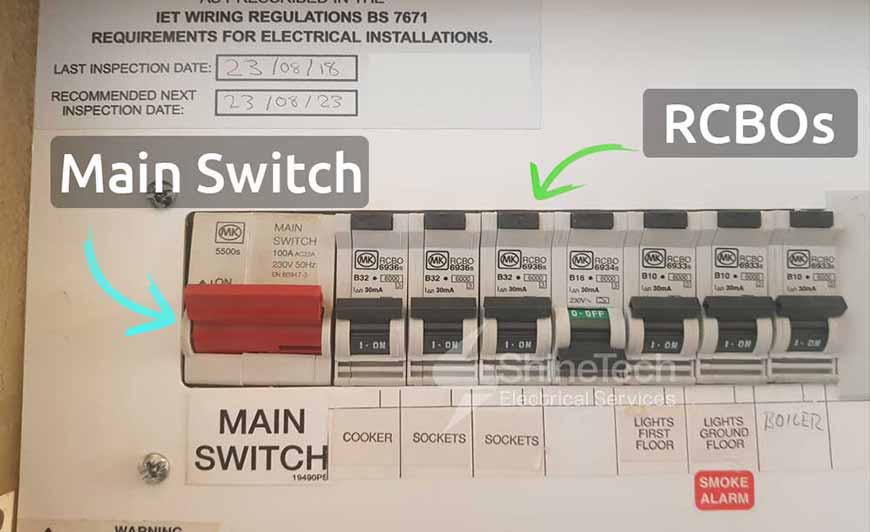The Function of Consumer Units in Reliable Energy Monitoring Systems
Consumer units are essential to effective energy management systems, offering as the primary circulation points for electric power within structures. The arrival of smart innovations has even more boosted their capability, allowing for real-time information tracking and nuanced energy usage analysis.
Recognizing Customer Units

Recognizing the function of customer systems begins with recognizing their necessary function in safeguarding electric systems. By separating mistakes within certain circuits, customer units avoid extensive interruptions and prospective fire dangers. This isolation is achieved via the use of breaker that trip or integrates that strike when a mistake is found, thereby removing the electrical circulation to the affected circuit.
Furthermore, customer systems help with the organized distribution of power, enhancing the effectiveness of energy use. They permit for the methodical management of electrical lots, which can be specifically essential in commercial and business settings where demand can change considerably. Appropriately conserved customer systems contribute to the durability of electric systems and aid in reducing downtime brought on by electric failures, inevitably sustaining the smooth operation of energy-dependent facilities.
Smart Technologies Combination

A vital benefit of clever consumer units is their capability to leverage progressed algorithms and equipment learning for predictive analytics. This permits preemptive adjustments based upon usage patterns, weather report, and other variables, significantly enhancing total effectiveness. Wise customer devices facilitate demand reaction programs, where energy use can be dynamically readjusted during height durations to support the grid and minimize prices.
The integration of renewable resource resources, such as solar and wind, is likewise streamlined through clever consumer systems. By intelligently taking care of the intermittency of these resources, these units make sure a balanced and reliable energy supply. Furthermore, wise customer systems improve customer involvement by offering detailed insights and remote control capabilities via mobile applications, fostering an extra aggressive strategy to power preservation and sustainability.
Tracking Energy Consumption
Building on the capabilities of smart innovations assimilation, keeping an eye on power usage comes to be a critical emphasis within energy management systems. Reliable surveillance works as the structure for determining energy inadequacies and applying restorative steps. By leveraging advanced metering framework (AMI), real-time data on energy use can be gathered at granular degrees, supplying important insights right into usage patterns and peak demand durations. This data-centric method enables both consumers and power managers to make enlightened choices aimed at decreasing waste and improving overall performance.
Smart meters and Net of Points (IoT) tools play a critical duty in this tracking procedure. These tools can track energy usage in real-time, sending information to central systems for analysis. The gathered data is after that refined through innovative algorithms to detect abnormalities, forecast future usage, and suggest optimization strategies. In addition, cloud-based services offer scalable platforms for saving and assessing large datasets, assisting in remote surveillance and control.
The assimilation of these modern technologies not only equips customers with thorough details about their power usage but also sustains utility companies in taking care of lots circulation better. Inevitably, precise and continuous surveillance is essential for achieving energy effectiveness, price savings, and sustainability objectives within power administration systems.
Optimizing Appliance Use

One effective technique includes identifying optimal and off-peak hours to shift energy-intensive activities, such as washing or dishwashing, to times when power need is lower. This not just lessens strain on the grid but also profits from lower power tolls. Furthermore, integrating artificial intelligence algorithms permits anticipating upkeep, making sure devices operate at optimal effectiveness and lengthening their life expectancy.
Energy management systems can also include user-specific preferences and actions to tailor appliance use routines. As an example, clever lighting systems can adjust illumination based upon tenancy and all-natural light accessibility, while cooling and heating systems can preserve convenience degrees without excessive power use.
Encouraging Sustainability
Advertising sustainability within power administration systems includes not only improving effectiveness yet likewise promoting eco accountable practices. Customer devices are indispensable to this procedure, as they supply real-time information and control devices that make it possible for individuals to keep an eye on and reduce their power intake. By leveraging advanced modern technologies, consumer units can recognize energy-saving chances and facilitate the integration of eco-friendly power sources like solar and wind power.
One important element of promoting sustainability is informing customers on the advantages of responsible energy use. With comprehensive understandings given by consumer units, individuals can make educated choices that minimize their carbon footprint. These devices can advise ideal times for running high-energy devices based on grid need and eco-friendly energy availability, thereby decreasing dependence on fossil gas.
In addition, consumer units sustain the adoption of smart grid technologies, which improve the overall performance and reliability of energy distribution. By making it possible for two-way interaction in between consumers this link and utility service providers, these systems can dynamically change to energy demands, reducing waste and promoting the usage of lasting power techniques.
Conclusion
Customer devices, as important components of energy administration systems, substantially enhance electrical safety and security and efficiency within structures via circuit protection and wise technology assimilation. Furthermore, the consolidation of sustainable energy sources advertises lasting practices, adding to decreased total energy consumption and reduced carbon impacts.
Breakthroughs in smart modern technologies have actually reinvented the abilities of power management systems, especially with the assimilation of clever customer devices.Structure on the capabilities of smart innovations integration, monitoring energy usage becomes a vital emphasis within energy monitoring systems.Effective appliance use optimization is a critical component of energy management systems, aiming to boost efficiency and minimize unneeded power intake.Consumer devices, as important components of energy monitoring systems, considerably boost electrical safety and security and efficiency within go to my blog structures via circuit protection and smart modern technology combination. Furthermore, the consolidation of renewable power resources promotes sustainable techniques, contributing to decreased overall energy consumption and reduced carbon footprints.